Ecommerce businesses are always on the hunt for strategies to increase sales, improve customer satisfaction, and stand out in a competitive market. One solution stands out: AI tools. These advanced technologies can transform everything from customer interactions to inventory management, making them indispensable for online stores.
So, what are the best AI tools for ecommerce stores? This guide highlights 12 of the top solutions that can help your ecommerce store boost sales, personalize customer experiences, and optimize operations. These tools leverage machine learning, natural language processing, and data analysis to deliver actionable insights and improve conversion rates.
Beyond naming the tools, we’ll cover their key features, benefits, and how they’re revolutionizing the ecommerce industry. Whether you run an online business, manage ecommerce websites, or lead a team on an ai-powered ecommerce platform, this article has something for you.
Understanding the Role of AI in Ecommerce
Artificial intelligence is reshaping the ecommerce sector, offering tools and technologies that help businesses stay ahead in a competitive landscape. For an ecommerce business, AI can optimize operations, provide actionable insights, and enhance the customer experience in ways that were once unimaginable.
Personalized Shopping Experiences
AI tools use customer data and machine learning to analyze user behavior and preferences. This allows ecommerce platforms to deliver personalized customer experiences, such as product recommendations and tailored marketing messages. By creating these moments, businesses can increase customer engagement and conversion rates.
Improved Customer Interactions
With natural language processing and advanced AI, tools like chatbots provide 24/7 support, resolve queries faster, and ensure enhanced customer experiences. These tools analyze customer behavior to predict needs and respond effectively, reducing negative feedback and boosting loyalty.
Data-Driven Decision Making
AI-driven data analysis helps businesses understand market trends, customer segments, and performance metrics. With detailed analytics and predictive analytics, online retailers can make informed decisions about inventory, pricing, and marketing campaigns.
Scalable Content Creation
AI tools simplify the process of creating seo-optimized content, such as compelling product descriptions, marketing materials, and social media posts. These tools allow businesses to scale content creation without compromising quality or time efficiency.
Efficient Inventory Management
Inventory issues can cost businesses revenue and customers. AI-powered solutions monitor stock levels, predict demand, and automate reordering processes. This ensures that ecommerce stores always have the right products available without overstocking.
Top 12 AI Tools for Ecommerce Stores to Drive Sales
Here’s a curated list of the best AI tools for ecommerce businesses. These solutions address critical areas like personalized customer experiences, inventory management, marketing automation, and content creation. Each tool is designed to help your online business thrive and increase sales.
1. Desku
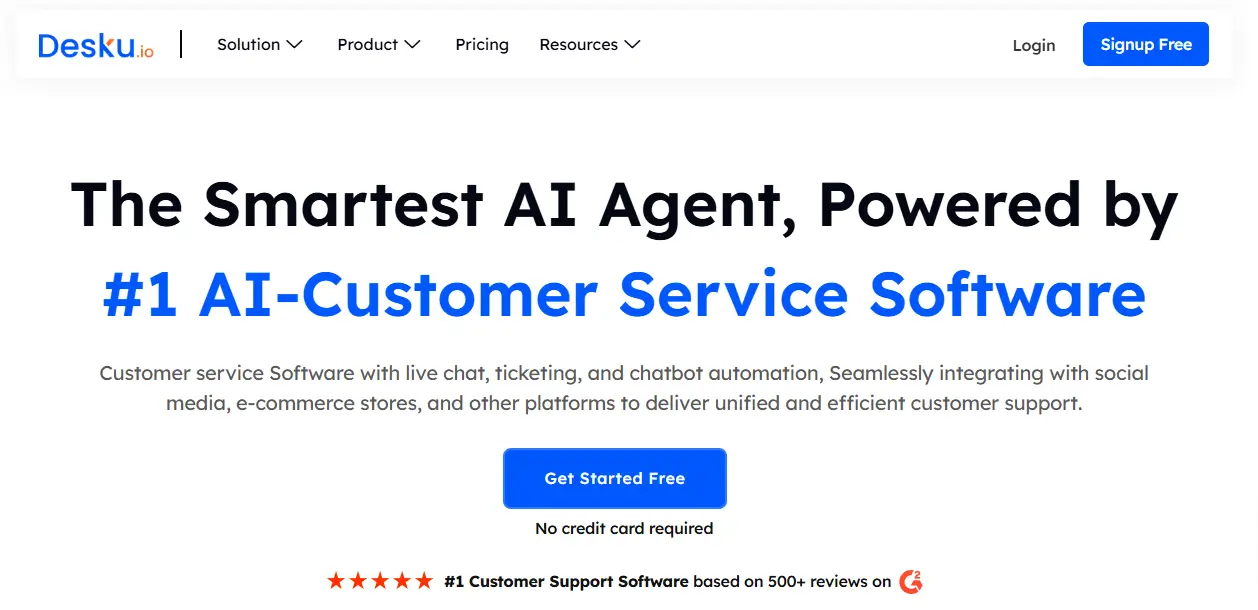
Desku is an AI-powered ecommerce tool designed to streamline customer support and improve customer interactions. It provides a unified platform for managing tickets, live chat, and FAQs, ensuring seamless customer satisfaction.
Key Features:
- Centralized customer support system with AI-driven ticket management.
- Real-time live chat powered by natural language processing.
- Advanced reporting and analytics for tracking customer behavior and support performance.
Benefits:
- Enhances customer engagement by resolving queries quickly.
- Simplifies support operations with a user-friendly dashboard.
- Provides actionable insights to improve team efficiency.
Why It’s Great for Ecommerce:
Desku is perfect for ecommerce websites looking to improve customer satisfaction while reducing response times and enhancing support quality.
Pricing:
Desku offers a free plan with limited features, while premium plans start at $49/month, including advanced analytics and multiple user access.
2. ChatGPT for Ecommerce
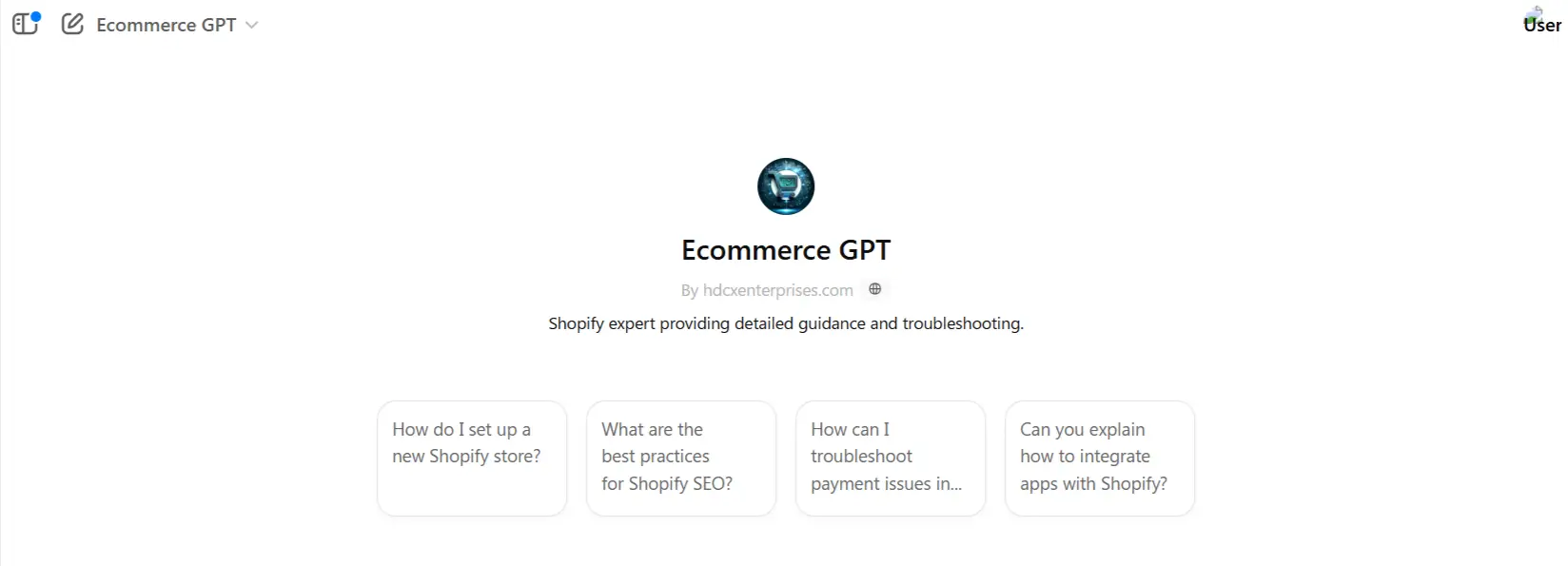
ChatGPT, powered by OpenAI, is an AI ecommerce tool that excels in natural communication. It’s perfect for automating customer interactions, enhancing support, and even assisting in content generation like product descriptions.
Key Features:
- Utilizes natural language processing to deliver human-like chat support.
- Provides instant responses to customer queries, boosting customer interactions.
- Can assist with compelling product descriptions and generating marketing messages.
Benefits:
- Enhances customer satisfaction by offering 24/7 assistance.
- Scales content creation for product pages and social media posts without manual effort.
Why It’s Great for Ecommerce:
Perfect for ecommerce websites looking to improve customer engagement and create a seamless shopping experience.
Pricing:
ChatGPT offers a free plan with limited features, while the premium version starts at $20/month, providing access to advanced capabilities and faster response times.
3. Shopify Magic
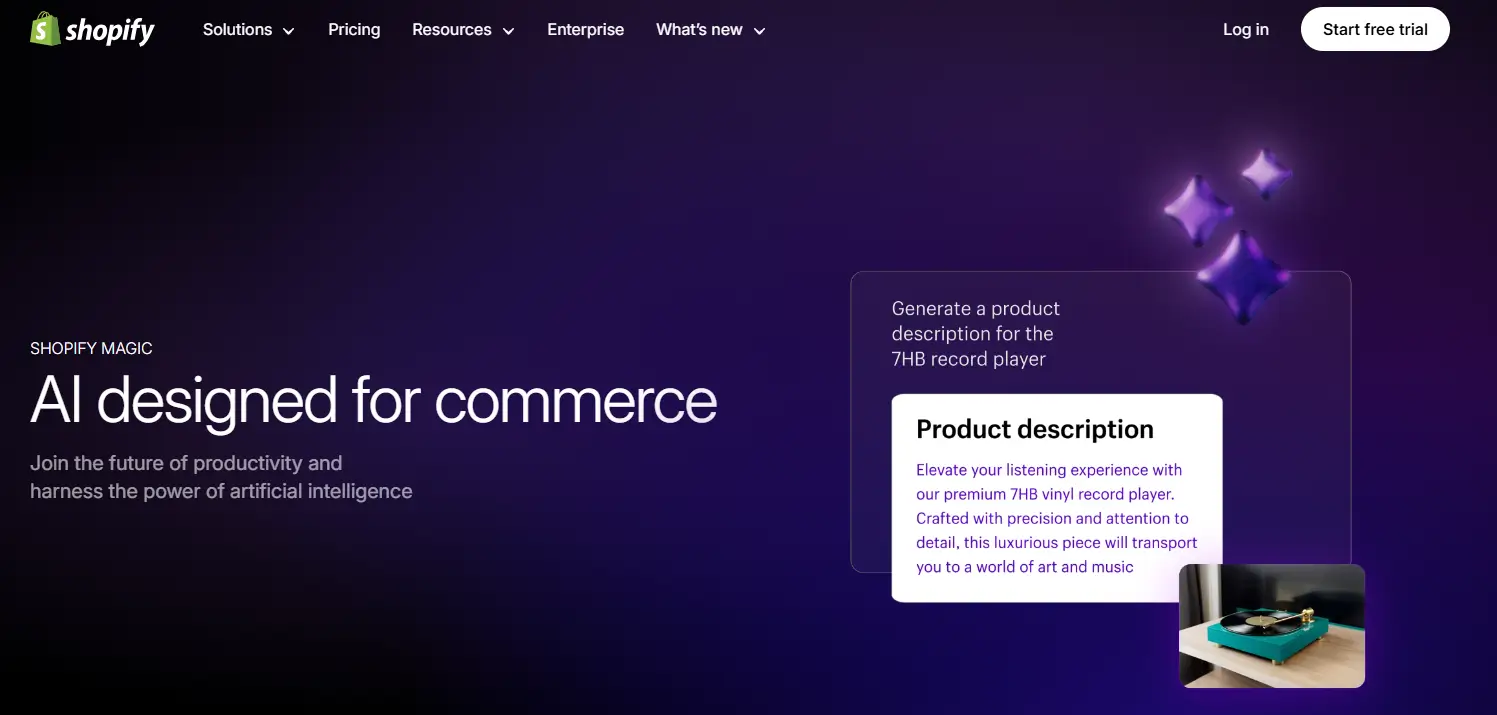
Shopify Magic is a built-in AI tool designed specifically for Shopify stores. It simplifies content creation and provides actionable insights to help businesses optimize their online store for better sales.
Key Features:
- Built-in AI for Shopify stores.
- Generates product descriptions and automates store content.
- Provides performance data insights to optimize sales strategies.
Benefits:
- Improves the speed of launching new products with AI-powered content.
- Enhances SEO-optimized content for better search engine rankings.
Why It’s Great for Ecommerce:
Ideal for online retailers aiming to maintain a competitive edge with AI-integrated store management.
Pricing:
Shopify Magic is included in all Shopify plans, starting at $29/month for basic store management and AI-powered features.
4. Dynamic Yield
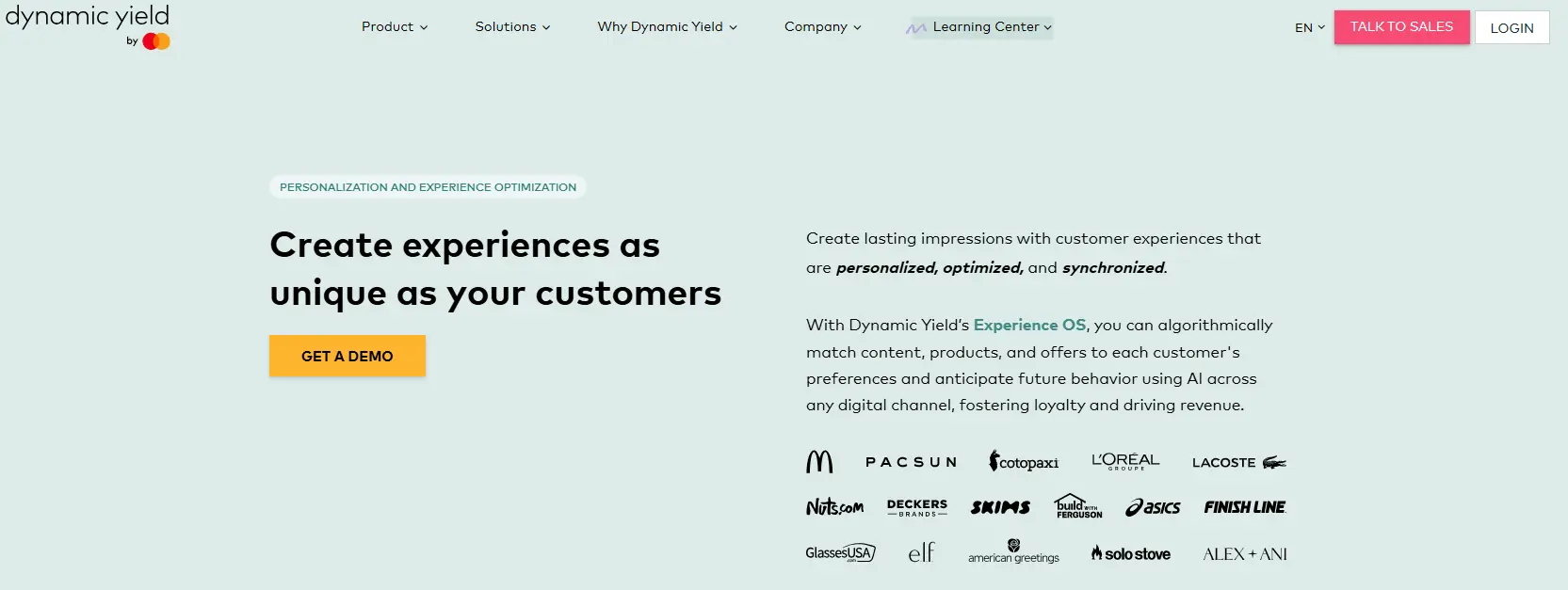
Dynamic Yield specializes in creating personalized shopping experiences. With its customer segmentation and recommendation features, this tool is a favorite among ecommerce marketers.
Key Features:
- Offers advanced customer segmentation for personalized marketing.
- Optimizes user interactions through tailored product recommendations.
- Provides tools for building personalized shopping experiences.
Benefits:
- Increases conversion rates by targeting customers with relevant suggestions.
- Enhances the shopping experience on ecommerce platforms.
Why It’s Great for Ecommerce:
Essential for creating customized journeys on ecommerce sites to boost engagement.
Pricing:
Dynamic Yield offers customized pricing based on business size and needs. Contact their sales team for a detailed quote.
5. Tidio
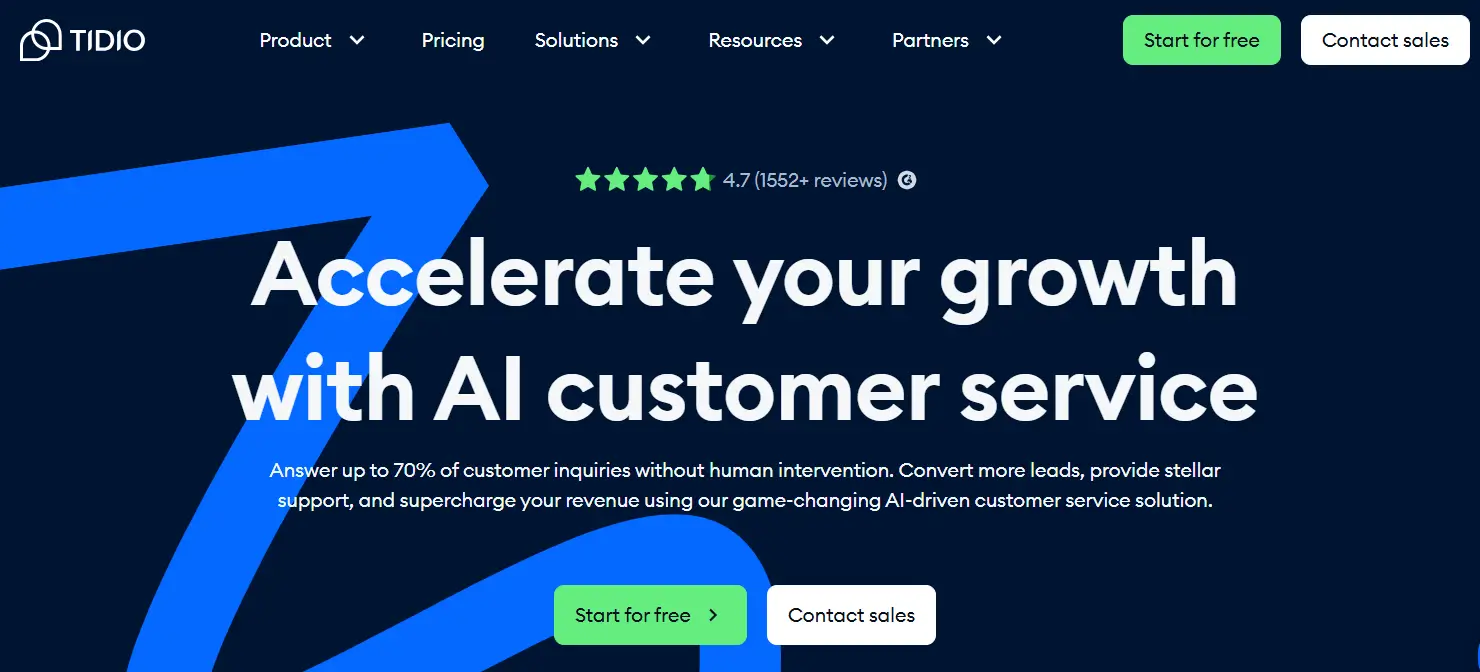
Tidio is an AI-powered ecommerce tool that combines live chat, chatbots, and customer data analytics into one platform. It’s a must-have for improving customer interactions.
Key Features:
- AI-powered chatbot for instant customer communication.
- Tracks customer behavior and provides actionable insights.
- Integrates seamlessly with most ecommerce platforms.
Benefits:
- Reduces the workload for customer support teams.
- Boosts customer satisfaction with prompt responses and tailored solutions.
Why It’s Great for Ecommerce:
A go-to tool for ecommerce businesses aiming to improve customer interactions and drive loyalty.
Pricing:
Tidio offers a free version with basic chatbot features, while paid plans start at $25/month for advanced automation and analytics.
6. Inventory Planner

Inventory Planner helps ecommerce businesses streamline their inventory management by leveraging AI-powered predictive analytics. This tool minimizes stock issues and maximizes profitability.
Key Features:
- Predicts product demand using predictive analytics.
- Optimizes stock levels and automates restocking.
Benefits:
- Avoids overstocking and stockouts, ensuring smooth operations.
- Saves costs and improves operational efficiency.
Why It’s Great for Ecommerce:
A must-have for businesses struggling with inventory management and planning.
Pricing:
Plans start at $99/month, with pricing scaling based on the number of SKUs managed.
7. ReConvert
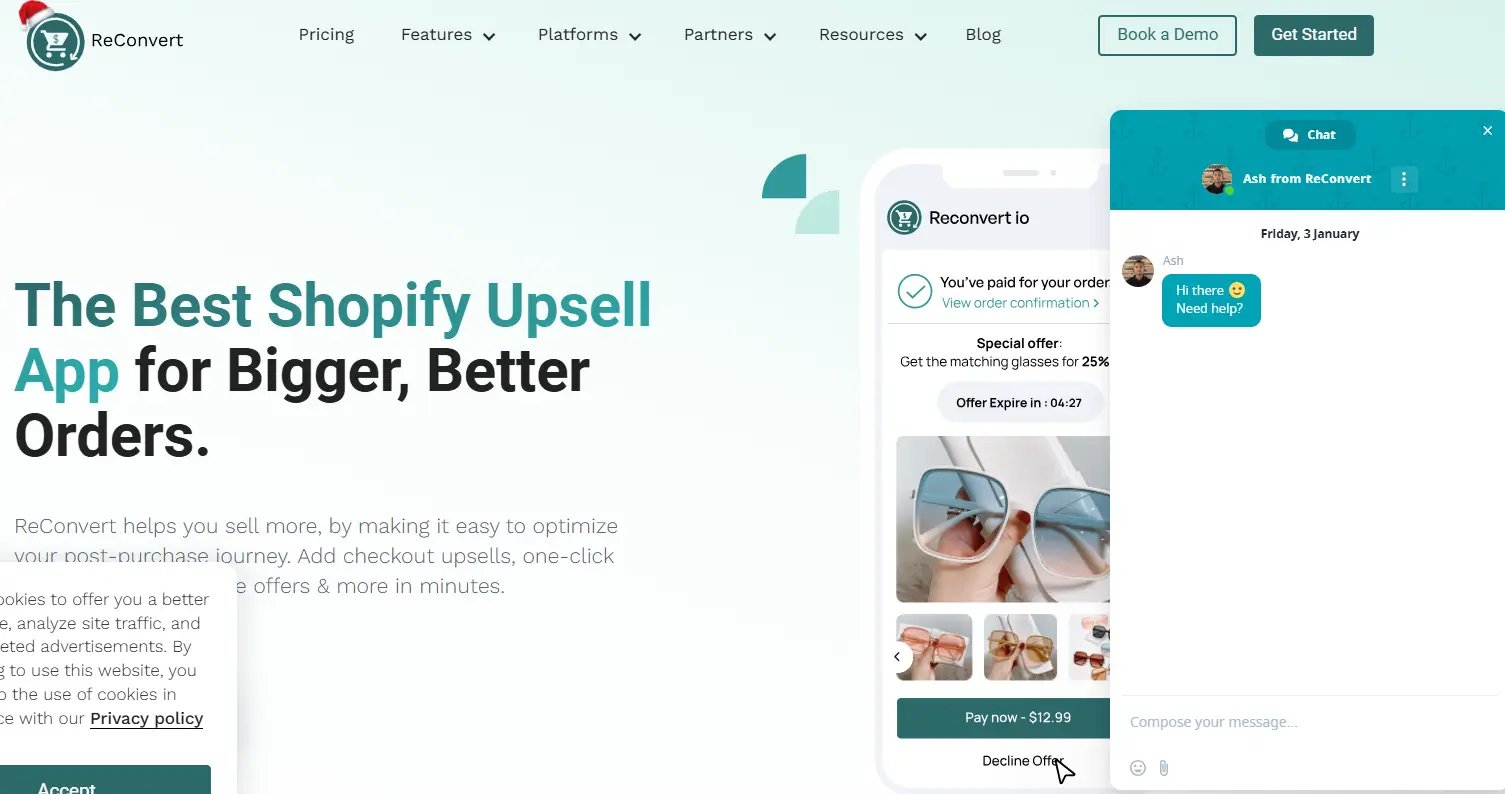
ReConvert focuses on post-purchase optimization. This AI tool helps ecommerce businesses maximize revenue by suggesting tailored upsell opportunities based on user behavior.
Key Features:
- AI-powered post-purchase upsell platform.
- Analyzes user behavior to suggest complementary products.
Benefits:
- Increases average order value with strategic upsell offers.
- Boosts customer retention by creating engaging post-purchase interactions.
Why It’s Great for Ecommerce:
Perfect for businesses looking to capitalize on every transaction.
Pricing:
ReConvert offers a free plan for stores with limited monthly sales, while paid plans start at $7.99/month.
8. Jasper AI
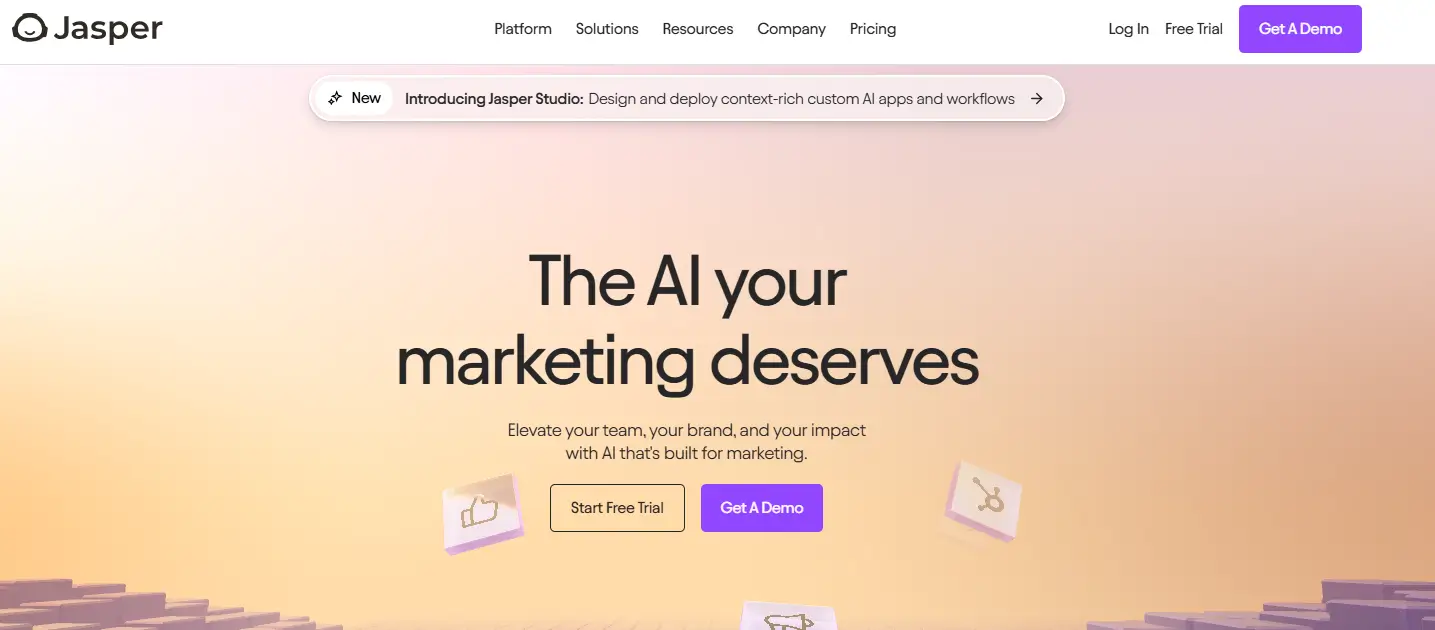
Jasper AI is a leading content-generation platform for ecommerce companies. It helps in crafting seo-optimized content, marketing materials, and compelling product descriptions quickly and efficiently.
Key Features:
- Generates content creation for blogs, product descriptions, and ads.
- Helps create seo-optimized content with relevant keywords.
Benefits:
- Saves time for marketing teams while maintaining quality.
- Boosts search engine rankings and attracts more traffic.
Why It’s Great for Ecommerce:
Best for scaling content needs without compromising quality.
Pricing:
Plans start at $49/month for 35,000 words, with options to scale based on content needs.
9. Klevu
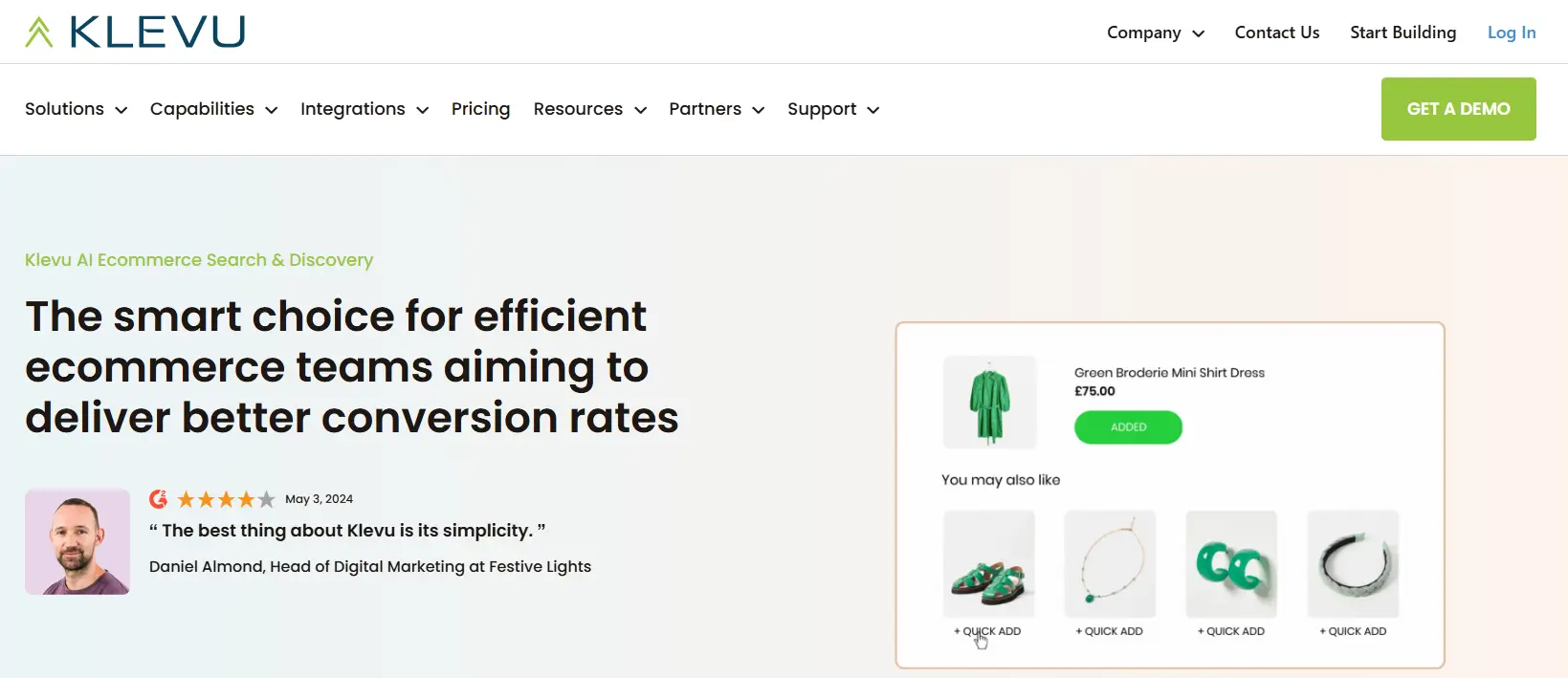
Klevu is an AI-powered search tool that revolutionizes the way customers interact with ecommerce websites. It delivers fast and relevant search results, enhancing customer satisfaction.
Key Features:
- Provides AI-powered search and navigation for ecommerce platforms.
- Enhances user interactions by delivering accurate search results.
Benefits:
- Improves core web vitals with faster and relevant product searches.
- Increases customer satisfaction with a user-friendly experience.
Why It’s Great for Ecommerce:
A vital tool for optimizing product pages and search functionality.
Pricing:
Klevu offers custom pricing tailored to your online store needs. Contact their sales team for a quote.
10. Optimizely
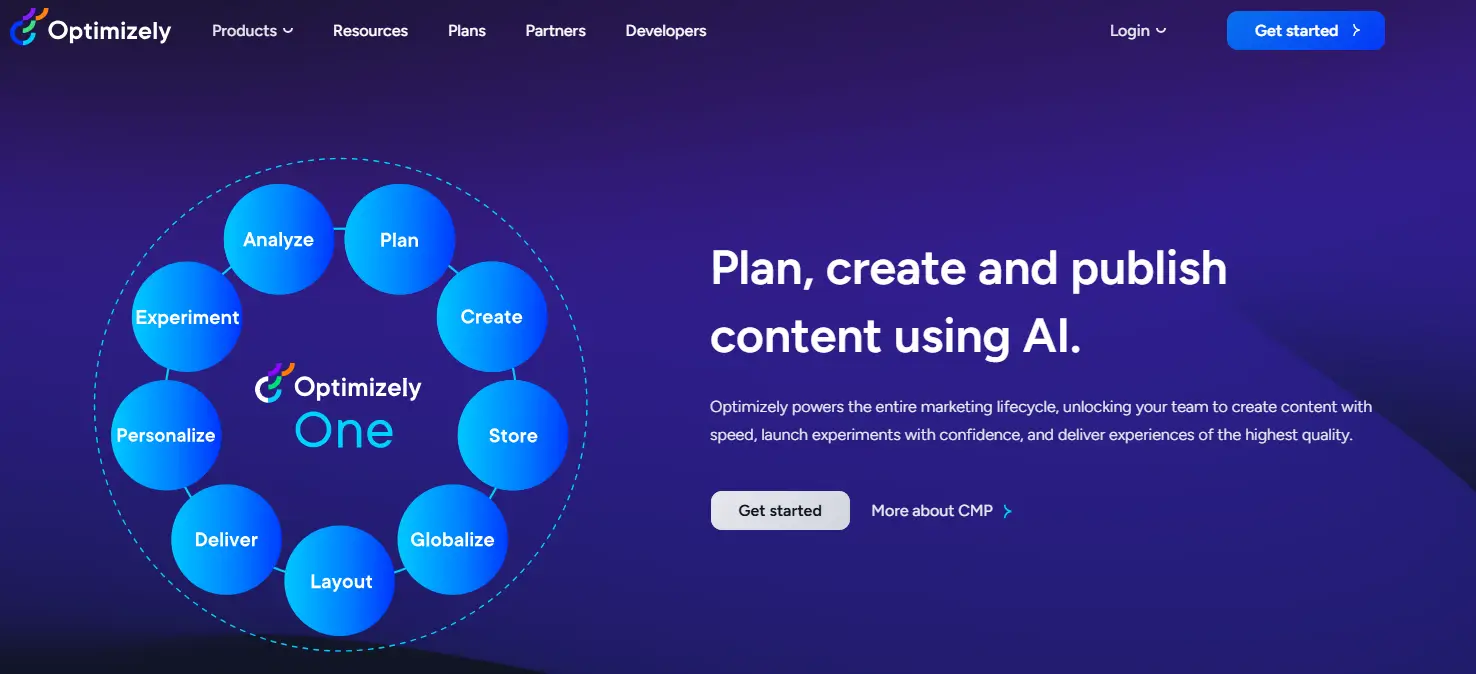
Optimizely uses AI-driven A/B testing to help businesses optimize their ecommerce sites. It provides detailed analytics for better decision-making and data-driven optimizations.
Key Features:
- AI-based A/B testing platform for ecommerce sites.
- Provides detailed analytics to optimize landing pages and content.
Benefits:
- Enhances engagement and conversion rates.
- Delivers insights to improve customer behavior tracking.
Why It’s Great for Ecommerce:
Ideal for improving overall performance with data-backed decisions.
Pricing:
Optimizely’s pricing is customized based on features and business size. Reach out for a detailed quote.
11. Yotpo
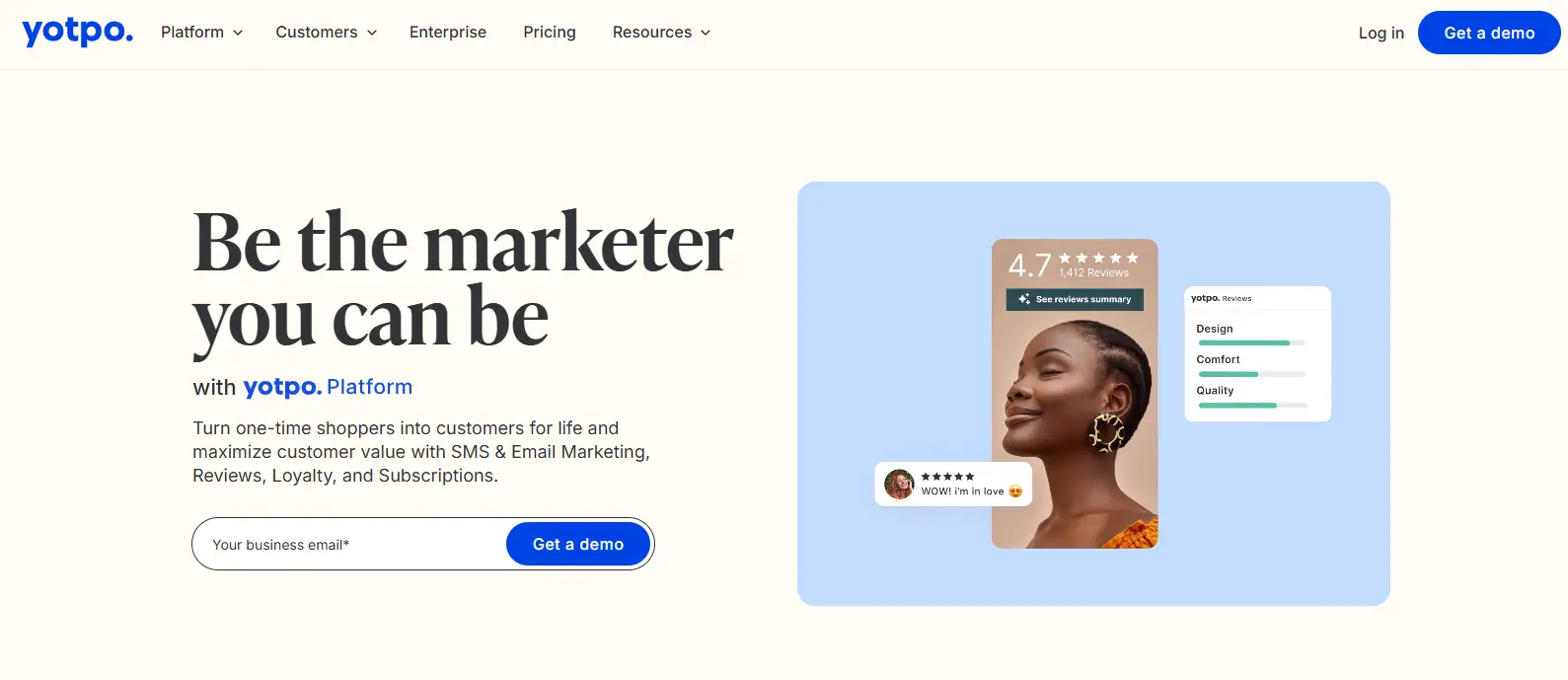
Yotpo helps ecommerce businesses collect and display user-generated content like reviews and ratings, building trust and credibility among customers.
Key Features:
- AI-powered platform for collecting and displaying customer reviews.
- Helps create trust with user-generated content.
Benefits:
- Increases conversion rates with authentic feedback.
- Enhances brand credibility and builds long-term loyalty.
Why It’s Great for Ecommerce:
Perfect for ecommerce retailers focusing on customer trust.
Pricing:
Yotpo offers a free plan for basic features, with paid plans starting at $19/month for advanced capabilities.
12. Predis AI ad generator

Predis is an AI-based product ads and video generation tool for e-commerce stores. It has built-in integration with most leading e-commerce platforms. It can make ads, videos, posts, and captions using product details directly from your catalogue. Its USP is its auto-posting feature that completely automates your social media content creation and scheduling without you spending any time and effort.
Key features:
- Links with your e-commerce store to automate content and publishing
- Create product ads and videos from your product details
- Create posts, reels, carousels, captions, and hashtags
- Create custom product background images with AI
Benefits:
- Save time in creating and editing ads and product videos
- Save time by automating content publishing with auto-posting
- Create an entire month’s worth of content calendar in a few minutes
Pricing:
Predis.ai offers a Free plan along with paid plans that start at $27 per month.
Implementation Strategies for AI Tools
Adopting AI tools in your ecommerce business can streamline operations and drive measurable results. However, a smooth implementation process is crucial to reap the benefits without disruptions. Here’s a step-by-step guide to successfully integrating AI into your ecommerce platform.
1. Assess Your Current Setup
Start by evaluating your existing systems, such as CRM, inventory management software, or marketing tools. Understanding your current processes helps identify integration points for AI tools.
Checklist:
- Compatibility with existing software.
- Areas where AI can add value, like customer interactions or data analysis.
- Potential gaps that AI can fill, such as content creation or predictive analytics.
2. Start Small with Pilot Projects
Begin with a specific use case or tool to test its impact. For instance:
- Implement a chatbot like Tidio to improve customer engagement.
- Use Inventory Planner to optimize stock management.
This approach allows you to monitor results, gather feedback, and address challenges before scaling up.
3. Train Your Team
AI tools often come with a learning curve. Equip your team with the skills and knowledge needed to use these tools effectively. Many providers offer resources like tutorials, guides, and dedicated support.
Training Essentials:
- Understanding the tool’s user-friendly dashboard.
- Learning to interpret performance data and customer insights.
- Ensuring marketing teams know how to generate seo-optimized content or automate marketing campaigns.
4. Integrate Gradually
Avoid overloading your operations with too many tools at once. Integrate AI solutions one at a time to monitor how they interact with your ecommerce store and other systems.
Pro Tip:
- Begin with tools that offer the highest ROI, such as those improving conversion rates or automating repetitive tasks.
5. Monitor and Optimize
Track the tool’s performance using metrics like:
- Engagement and conversion rates
- Customer satisfaction and customer behavior trends
- ROI from tasks like content creation or inventory management
Use this data to fine-tune your strategy and ensure the tool is delivering value.
6. Leverage Support and Feedback
Stay in touch with the tool’s support team for troubleshooting and feature optimization. Additionally, collect feedback from your team and customers to identify further improvements.
7. Scale Up
Once you’ve tested and refined the tool’s usage, expand its implementation across other areas of your business. For example:
- Use AI for marketing automation and personalized customer experiences.
- Expand to tools for social media posts, detailed analytics, or core web vitals optimization.
Case Studies: Success Stories of AI in Ecommerce
Real-world examples demonstrate how AI tools can revolutionize the ecommerce industry. Here are a few case studies showcasing businesses that implemented AI solutions to achieve remarkable results.
1. Sephora: Enhancing Customer Interactions with Virtual Assistants

Problem:
Sephora wanted to improve customer engagement and provide personalized product recommendations.
Solution:
The company integrated a chatbot powered by natural language processing to guide users in product selection and answer queries in real time.
Results:
- 90% increase in customer satisfaction through personalized shopping experiences.
- Boosted conversion rates by recommending complementary products.
Takeaway:
Implementing an AI-powered chatbot can elevate customer interactions and drive sales for online retailers.
2. ASOS: Boosting Conversion Rates with AI Recommendations

Problem:
ASOS faced challenges in improving product discovery for customers browsing their extensive catalog.
Solution:
Using AI-based recommendation engines, ASOS analyzed user behavior to offer personalized suggestions.
Results:
- 35% increase in conversion rates by matching products with customer preferences.
- Enhanced customer satisfaction by simplifying product search.
Takeaway:
AI-driven personalization can transform the shopping experience and improve sales on ecommerce platforms.
3. Amazon: Optimizing Inventory Management with AI

Problem:
Amazon needed a way to handle complex inventory management across global warehouses while meeting customer demand efficiently.
Solution:
The company adopted AI-driven tools for predictive analytics, demand forecasting, and automated reordering.
Results:
- Reduced inventory costs by 25%.
- Improved fulfillment times, boosting customer loyalty.
Takeaway:
Leveraging AI for inventory management ensures better stock control and operational efficiency.
4. Netflix: Personalizing Recommendations to Drive Engagement

Problem:
Although not an ecommerce company, Netflix’s use of AI provides insights for online businesses aiming to retain customers through tailored experiences.
Solution:
Netflix employed machine learning to study viewing habits and deliver highly targeted recommendations.
Results:
- 80% of content streamed came from AI recommendations.
- Improved customer retention through enhanced personalization.
Takeaway:
Using AI to study customer behavior can help create personalized customer experiences, boosting engagement and loyalty.
5. H&M: Scaling Content Creation with AI

Problem:
H&M needed to generate seo-optimized content for new product launches across various markets.
Solution:
The brand used Jasper AI to automate content creation for product descriptions and marketing materials.
Results:
- Reduced content production time by 60%.
- Improved search engine rankings for product pages.
Takeaway:
AI tools like Jasper enable businesses to scale content creation without compromising quality.
These case studies highlight the transformative power of AI in the ecommerce sector, showing how it can drive growth, improve efficiency, and enhance customer experiences.
Desku for Shopify Inbox
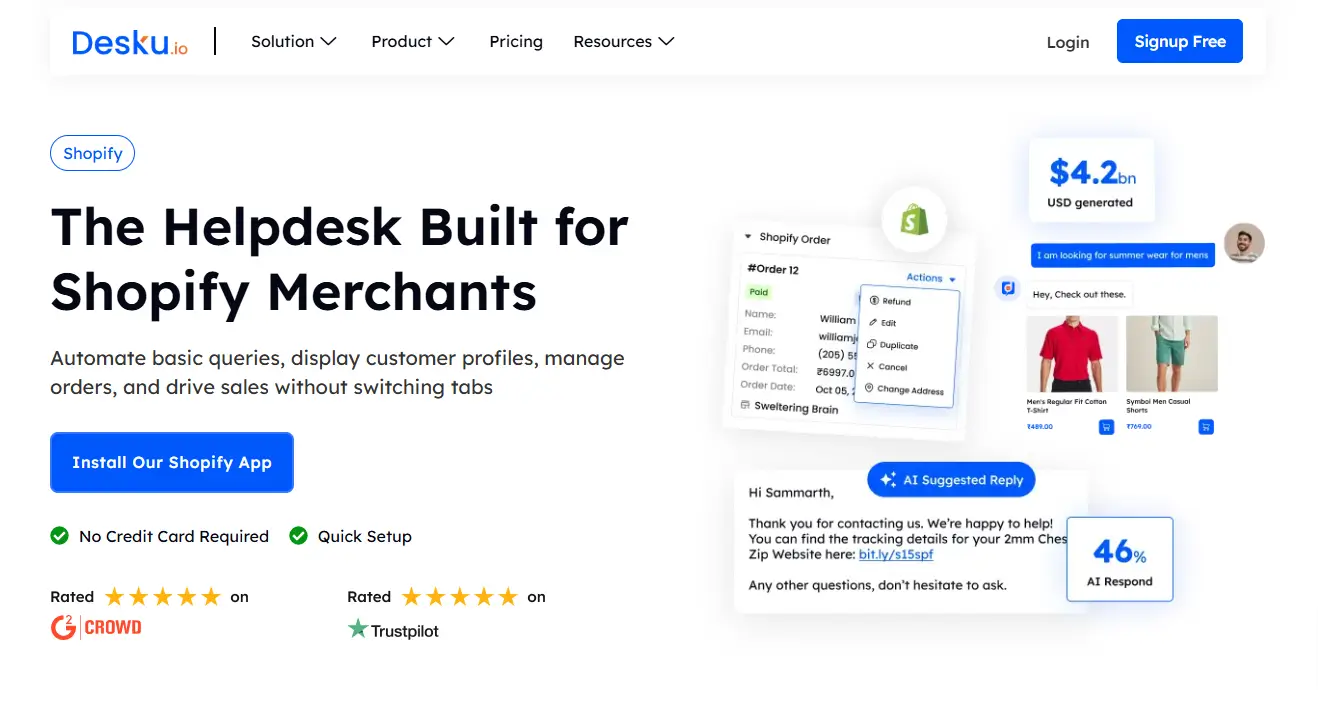
Elevate your Shopify store’s customer service with Desku for Shopify Inbox. This all-in-one helpdesk solution brings every support channel—email, live chat, social media messages—into a single, organized inbox. By integrating seamlessly with Shopify, you can pull order details and customer profiles directly into your dashboard, making it simple to personalize responses. With AI-powered automation, repetitive queries get instant, accurate replies, while your team focuses on complex support issues. The result? Happier customers, shorter response times, and fewer support headaches.
Key Highlights
- Centralized Support: Consolidate all customer interactions into one inbox.
- AI-Enhanced Efficiency: Use automated workflows to quickly handle FAQs and speed up resolutions.
- Seamless Shopify Integration: Access order history and customer data without leaving Desku.
Desku for WooCommerce
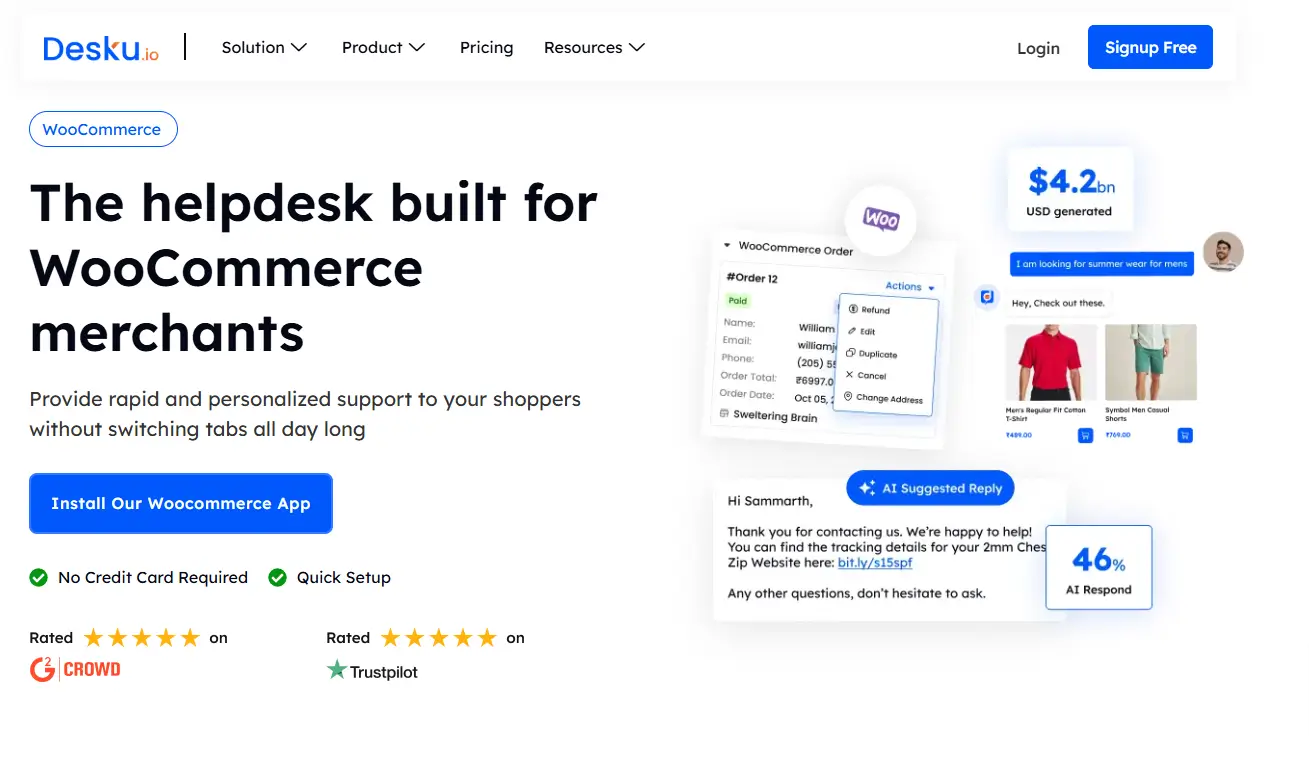
Running a WooCommerce store means juggling products, orders, and inventory. Simplify your customer service workload with Desku for WooCommerce. By unifying multiple communication channels and leveraging real-time order syncing, you’ll have a clearer view of each customer’s journey. Automated ticket routing assigns inquiries to the right agent, while detailed reporting tools help you gauge performance and optimize support strategies.
Key Highlights
- Streamlined Helpdesk: Manage chats, emails, and social messages in one place.
- Order-Level Insights: Connect WooCommerce order data to quickly spot trends and resolve issues.
- Customizable Workflows: Automate repetitive tasks and free up resources for higher-value tasks.
Desku for Ecwid Helpdesk
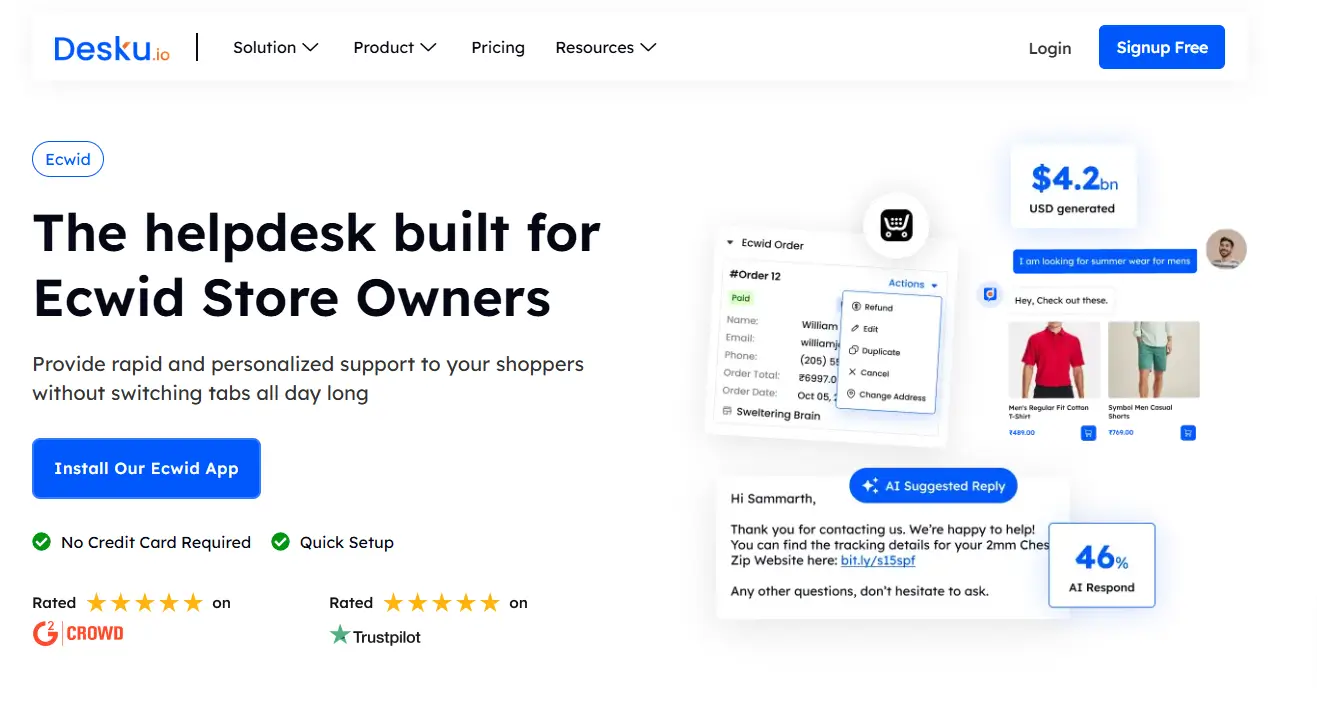
If you’re using Ecwid to power your online store, Desku for Ecwid is built to merge your store’s vital information with a robust helpdesk platform. Agents can see purchase history and shipping details at a glance, making support more proactive and personalized. Plus, an intuitive dashboard keeps your team on track with real-time updates on pending, resolved, and high-priority tickets.
Key Highlights
- Integrated Dashboard: Track orders, issues, and customer insights all in one place.
- Proactive Notifications: Get automated alerts for new or escalated tickets to maintain swift response times.
- In-Depth Analytics: Analyze query types and resolution rates for ongoing optimization.
Desku for Shopline
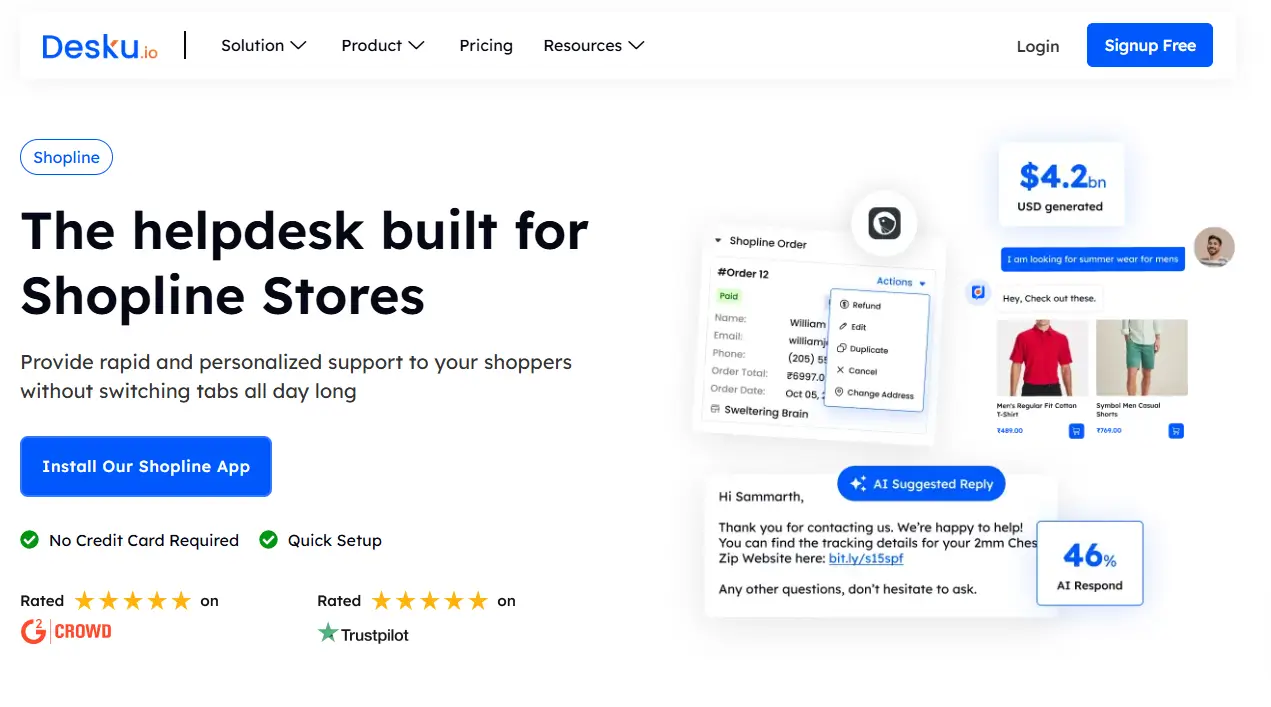
Optimize your Shopline storefront’s support system with Desku for Shopline. This specialized solution consolidates every support channel into a clean, central hub, so you never miss a customer inquiry. AI tools help identify patterns in questions and even craft answers for frequently asked queries, saving time and ensuring consistency. Meanwhile, built-in collaboration tools let your team work together seamlessly to resolve tickets faster and keep customers loyal.
Key Highlights
- Unified Communications: Manage live chat, social media, and email conversations effortlessly.
- AI-Driven Responses: Automate replies to FAQ-style queries without sacrificing personalization.
- Team Collaboration: Simplify ticket assignment and internal discussions for quicker resolutions.
Desku EVA
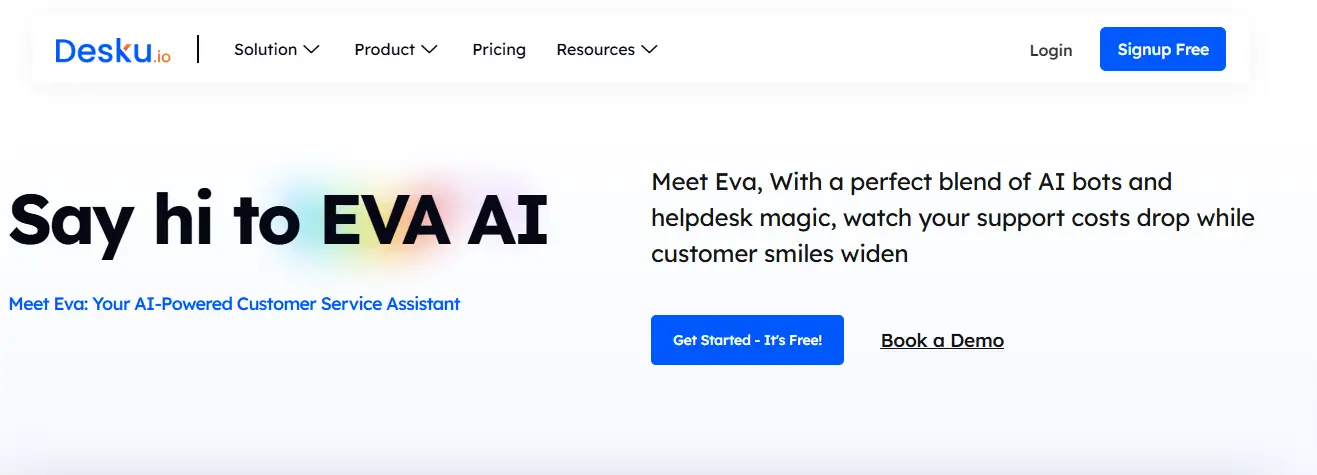
Enter Desku EVA, your virtual support assistant that’s powered by cutting-edge AI. EVA can handle routine inquiries around the clock, providing instant answers and collecting pertinent customer information before escalating to a human agent if necessary. With smart intent detection and natural language processing, EVA not only responds accurately but also learns from every interaction—making it an indispensable tool for reducing response times and boosting overall customer satisfaction.
Key Highlights
- 24/7 Availability: Never miss a question or sale, even outside business hours.
- Natural Language Processing: Understands user queries to deliver precise, context-aware responses.
- Continuous Learning: Improves over time, refining its capabilities with every customer interaction.
How Desku Fits into Your E-Commerce Tech Stack
Whether you’re selling on Shopify, WooCommerce, Ecwid, or Shopline, Desku’s lineup of helpdesk integrations and AI solutions centralize your customer communications, streamline ticket handling, and free up your team to focus on strategic growth. By combining automation, analytics, and a seamless user experience, Desku empowers your store to deliver world-class support—no matter the platform
Frequently Asked Questions (FAQ)
1. What are the best AI tools for ecommerce stores?
The best AI tools for ecommerce stores include ChatGPT, Shopify Magic, Dynamic Yield, and Jasper AI. These tools excel in areas like personalized shopping experiences, content creation, and inventory management.
2. How can AI improve my ecommerce business?
AI can enhance customer satisfaction, boost conversion rates, and streamline processes such as marketing automation, product recommendations, and data analysis. It provides actionable insights and automates tasks to save time and resources.
3. Are AI tools expensive for small businesses?
Many AI tools offer free versions or affordable plans, making them accessible for SMBs and startups. Examples include Tidio and ReConvert, which have budget-friendly pricing.
4. What AI tools are best for content creation?
For seo-optimized content and compelling product descriptions, tools like Jasper AI and Shopify Magic are excellent choices.
5. How do AI tools handle customer data?
AI tools leverage customer data securely to deliver insights and personalized customer experiences. It’s essential to choose tools that comply with data protection regulations.
- About the Author
- Latest Posts
Gaurav Nagani was the Founder of Desku, an AI-powered customer service software platform.
- Email Management: Best Strategies, Tools & Tips for SaaS and Ecommerce
- Shared Inbox Guide: Definition, Benefits, Tools & Best Practices 2025
- LivePerson Pricing Exposed: What They Don’t Show You on Their Website
- Automate Customer Support with AI A Practical Guide
- Desku vs UsePylon: Which One Scales Better for Startups?


